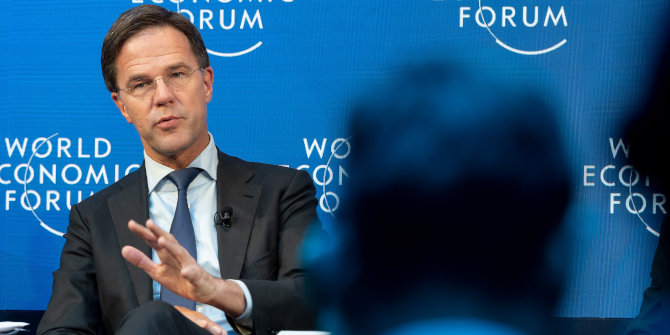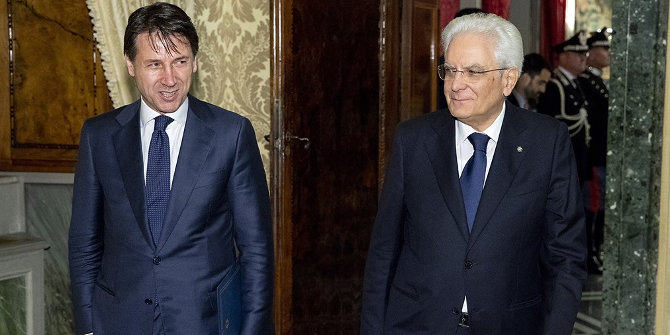What policy issues determined support for parties during the 2021 German federal election? Davide Angelucci, Lorenzo De Sio, Heiko Giebler and Werner Krause present conclusions from an analysis of the key topics that encouraged vote-switching during the campaign. They find the SPD’s victory was mainly driven by its credibility on economic issues.
The 2021 German federal election was a showcase for electoral volatility – not just in terms of the result, but also in relation to changes in the polling during the campaign. But while the strengths and weaknesses of the leading candidates were clearly of great importance, what were the key issues that actually drove the result? Given the importance of the election, we would expect new issues to play a role and also potential changes in the salience of issues for voters and parties alike.
While this question is of paramount importance, in previous elections it has often been left without a clear and rigorous answer. We attempt to address this gap by leveraging an innovative research design based on two methodological innovations. First, rather than focusing on vote choice, we focus instead on vote change, that is, the shift from a party in the previous election to another in the current election. By focusing on vote change we can directly analyse the individual-level mechanism producing aggregate gains or losses for a party. Second, we employ an original, issue-rich survey dataset covering a large number of issues (31 in this case) with country-specific framing and wording.
Using this approach, we have estimated party-specific logistic regression models of vote inflows for each party based on the credibility respondents assigned to each party on a given issue. This effectively allows us to identify which issues attracted respondents to switch to a particular party. Hence, we can draw a comprehensive map of the issues that drove volatility in the election and help inform future research on parties’ electorates as a whole, as well as studies focusing on the effects of party campaign strategies.
Issue determinants of electoral success in the 2021 German federal election
Table 1 below presents the results of our analysis. For each issue, the presence of a circle means that the credibility respondents assigned to a party on the issue had a statistically significant effect on the decision to switch towards the party. It should be noted that although we tested the effect of 31 issues in total, only 15 showed a significant effect for at least one of the main parties in Germany.
Overall, our results show that the economy was key for the electoral success of the SPD – at least when it came to the party’s ability to attract new voters. The social democrats were rewarded for their credibility on traditional concerns of the left: namely raising the minimum wage and strengthening labour and employment protection. Together with these two economic issues, the party’s credibility on EU integration also played a role.
Table 1: Key vote-winning issues for German parties in the 2021 federal election
Note: The circles indicate that the credibility respondents assigned to the party for each issue had a statistically significant effect on the decision to switch towards that party. The fieldwork took place between 30/08/2021 and 06/09/2021. The universe corresponds to the adults (aged 18 or more) residing in Germany. The survey was conducted through a computer-assisted web interviewing (CAWI) technique on a sample of the target population. A non-probability quota sampling technique has been adopted using gender, age class, region of residence, and education as stratification variables. The dependent variable has been constructed as a combination of vote recall in the election of 2017 and vote intention in 2021 election.
Similarly, for the CDU/CSU, the economy played a vital role. The votes the CDU/CSU gained were tied to their credibility on achieving social justice and reducing unemployment, two valence issues which are a clear expression of demands for social and economic protection. We also found significant effects for two cultural (and positional) issues. The CDU/CSU campaigned against the promotion of gender-equal language and promoted the protection of a traditional family model. Both of these issues were decisive in attracting new voters. Of course, this analysis only indicates where the CDU/CSU gained voters – the substantial number of voters the party lost in comparison to the previous federal election also had a key impact on the result.
For Die Linke and the Greens, a combination of cultural and economic issues were the key drivers for attracting new voters. Die Linke was able to mobilise citizens based on its credibility in preserving the current pension age and protecting the country from terrorist attacks. At the same time, the party was unable to benefit from its more radical positions on its core issues, such as the minimum wage or the taxation of high incomes. Here, the campaigns of the SPD and the Greens were more successful. Interestingly, the party’s position on the balance between Covid-19 vaccination obligations and individual freedoms also helped attract voters.
As for the Greens, perhaps the most remarkable finding is the (almost) complete absence of green issues as significant predictors of new voters. If we exclude the party’s credibility on introducing a speed limit on German highways, no other environmental issue influenced the electoral gains of the party. Instead, we found that a combination of progressive, cultural and economic goals were the most electorally rewarding. The party’s gains were driven by its credibility on deepening EU integration and promoting all models of the family on the cultural side; while on the economic side, taxing high incomes and promoting social justice were important drivers of support. We also found an effect from the party’s credibility on globalisation.
The FDP was able to mobilise new voters based on its credibility on deepening EU integration and opposing speed limits on German highways. This profile enabled the party to take polarising positions vis-à-vis other smaller parties such as the Greens (on speed limits) or the AfD (on EU integration). We also found that the party was rewarded for its credibility on promoting market-liberal stances in the economic realm. Hence, it benefitted from its stances with regard to increasing the flexibility of the German pension system as well as its opposition toward increasing taxes for those with higher incomes and wealth.
Finally, the radical-right and populist AfD combined conservative policy objectives in the cultural domain with economically liberal policy objectives. The party was rewarded for its Euroscepticism, but also for its stance to create flexibility concerning the retirement age. It also attracted voters via issues related to climate change (energy transition and protection of the environment) as it was the only relevant German party questioning man-made climate change. Interestingly, both the AfD and Die Linke benefitted from their credibility on tackling terrorism, which is likely a consequence of the high levels of both right-wing and Islamist terrorism in recent years.
Characterising the election
Our analysis provides a complex issue characterisation of the election. It is clear the economy played a major role in determining the final outcome – at least when it came to vote-switching. This points to important differences compared to the 2017 election, in which economic issues did not play a major role. Not only the SPD, but also other parties both on the left and right were able to attract new voters via their credibility on economic issues. Interestingly enough, the SPD was especially rewarded for its leftist profile.
Overall, the electoral rewards gained from progressive stances on the economy speak to a demand for social and economic protection. Cultural issues, in comparison, played a weaker role. There is evidence that a divide over the EU, where the AfD’s Euroscepticism stands against the other mainstream parties, had an impact on support. Yet, the relevance of the EU as an issue was not matched by the immigration issue, which did not act as a significant predictor of vote-switching.
Perhaps most interestingly, our findings indicate that environmental issues played only a moderate role when it came to vote-switching – regardless of the salience parties and the media assigned to the topic. This calls for more in-depth research as it may be key to understanding why the Greens polled 25% at the beginning of the campaign yet only managed to secure 14.8% of the votes on election day.
Note: This article gives the views of the authors, not the position of EUROPP – European Politics and Policy or the London School of Economics. Featured image credit: Yannic Kreß on Unsplash







This is really interesting work. However, I believe, the conclusion wich the authors arrive at points in the wrong direction. Its not the economy, perhaps not even issues, that is or are responsible for the outcome of the election. It is for the most part leader effects: the fact that Merkel retired, Laschet did not prevail, and Scholz could profit from his vice-chancellor authority and resulting competence attributions explains much of the outcome for the two larger parties. Back to the issues: the strength of an effect — its explanatory power — is also an important piece of information in addition to its statistical significance, but the authors do not talk about that.